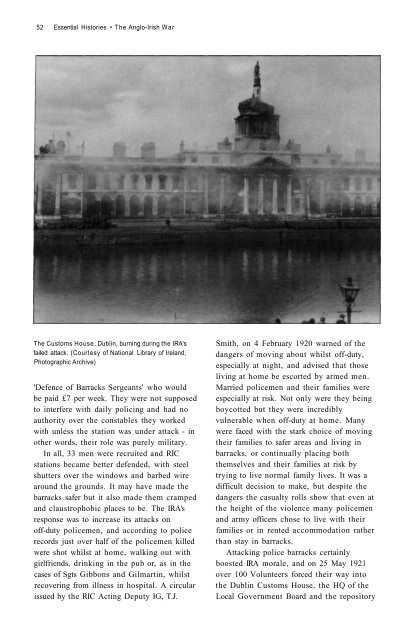Create successful ePaper yourself
Turn your PDF publications into a flip-book with our unique Google optimized e-Paper software.
52 <strong>Essential</strong> <strong>Histories</strong> • <strong>The</strong> <strong>Anglo</strong>-<strong>Irish</strong> <strong>War</strong><br />
<strong>The</strong> Customs House, Dublin, burning during the IRA's<br />
failed attack. (Courtesy of National Library of Ireland,<br />
Photographic Archive)<br />
'Defence of Barracks Sergeants' who would<br />
be paid £7 per week. <strong>The</strong>y were not supposed<br />
to interfere with daily policing and had no<br />
authority over the constables they worked<br />
with unless the station was under attack - in<br />
other words, their role was purely military.<br />
In all, 33 men were recruited and RIC<br />
stations became better defended, with steel<br />
shutters over the windows and barbed wire<br />
around the grounds. It may have made the<br />
barracks safer but it also made them cramped<br />
and claustrophobic places to be. <strong>The</strong> IRA's<br />
response was to increase its attacks on<br />
off-duty policemen, and according to police<br />
records just over half of the policemen killed<br />
were shot whilst at home, walking out with<br />
girlfriends, drinking in the pub or, as in the<br />
cases of Sgts Gibbons and Gilmartin, whilst<br />
recovering from illness in hospital. A circular<br />
issued by the RIC Acting Deputy IG, T.J.<br />
Smith, on 4 February 1920 warned of the<br />
dangers of moving about whilst off-duty,<br />
especially at night, and advised that those<br />
living at home be escorted by armed men.<br />
Married policemen and their families were<br />
especially at risk. Not only were they being<br />
boycotted but they were incredibly<br />
vulnerable when off-duty at home. Many<br />
were faced with the stark choice of moving<br />
their families to safer areas and living in<br />
barracks, or continually placing both<br />
themselves and their families at risk by<br />
trying to live normal family lives. It was a<br />
difficult decision to make, but despite the<br />
dangers the casualty rolls show that even at<br />
the height of the violence many policemen<br />
and army officers chose to live with their<br />
families or in rented accommodation rather<br />
than stay in barracks.<br />
Attacking police barracks certainly<br />
boosted IRA morale, and on 25 May 1921<br />
over 100 Volunteers forced their way into<br />
the Dublin Customs House, the HQ of the<br />
Local Government Board and the repository



